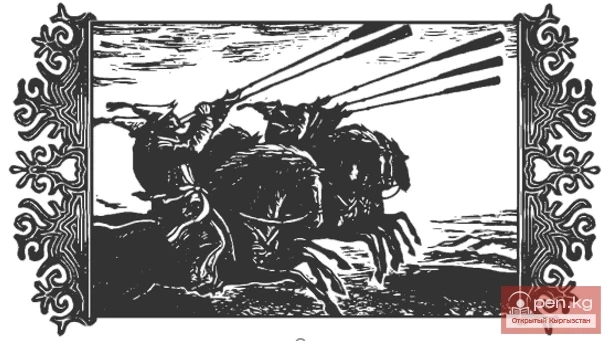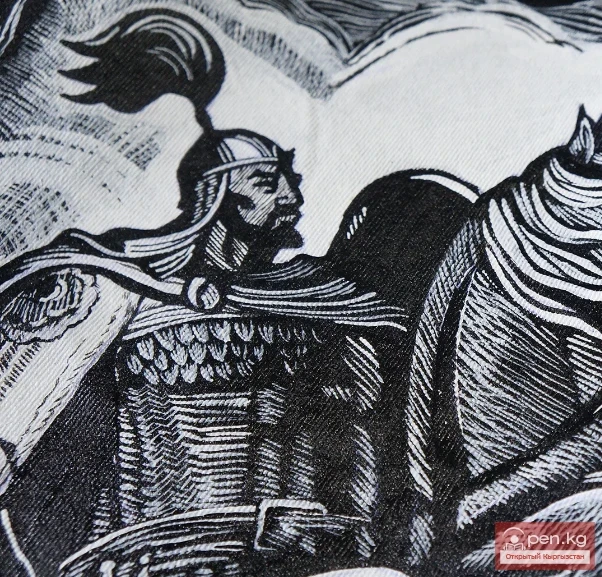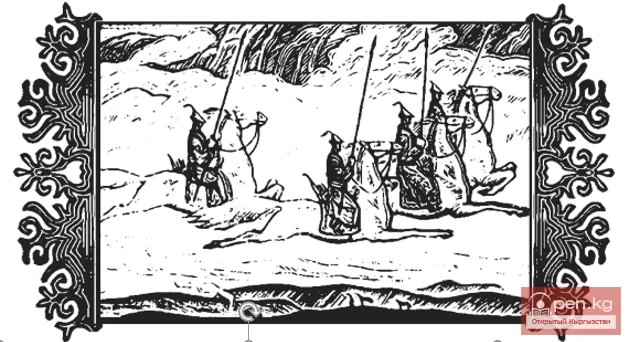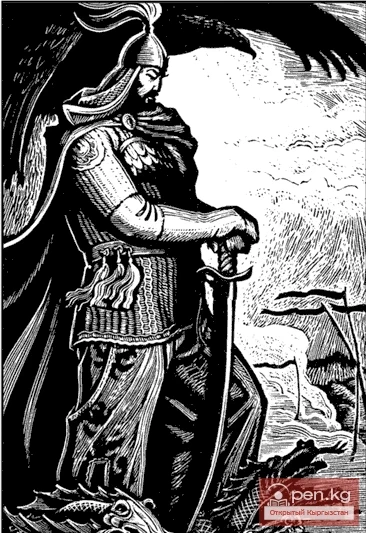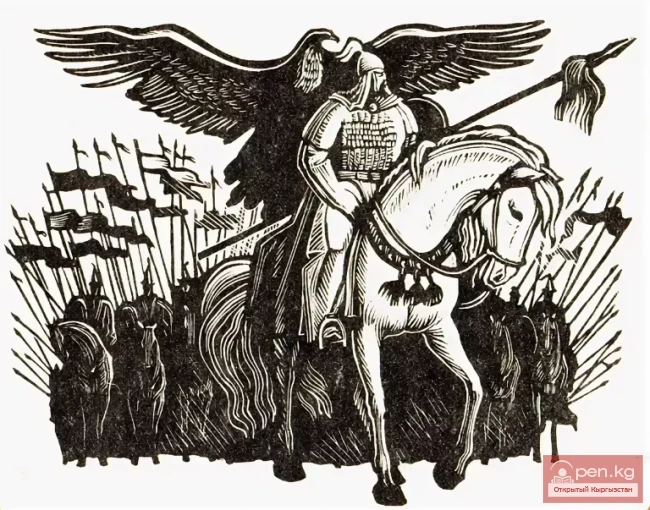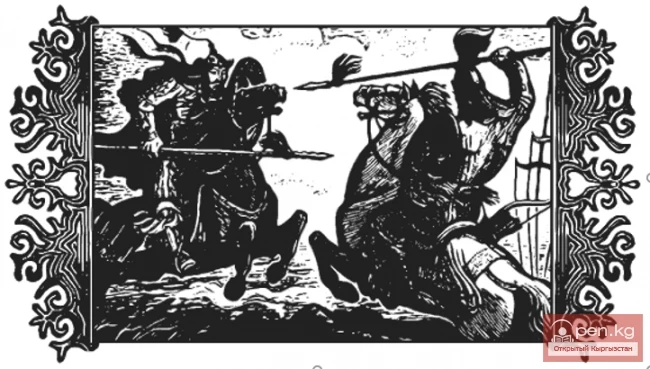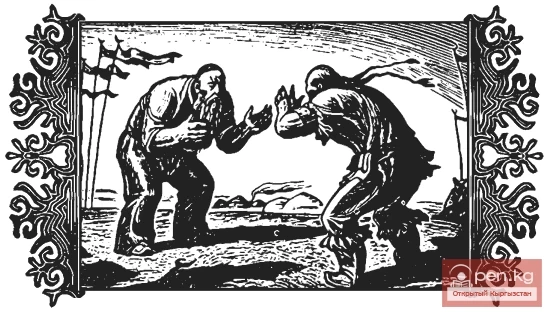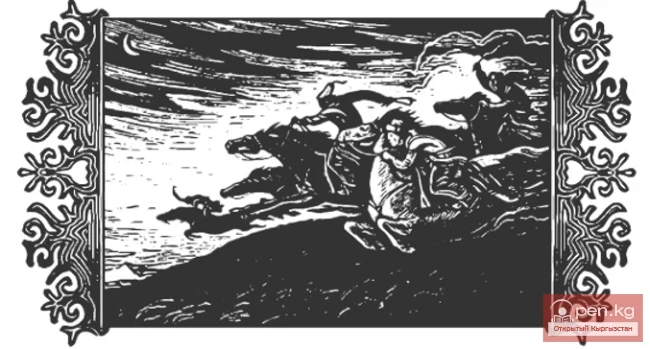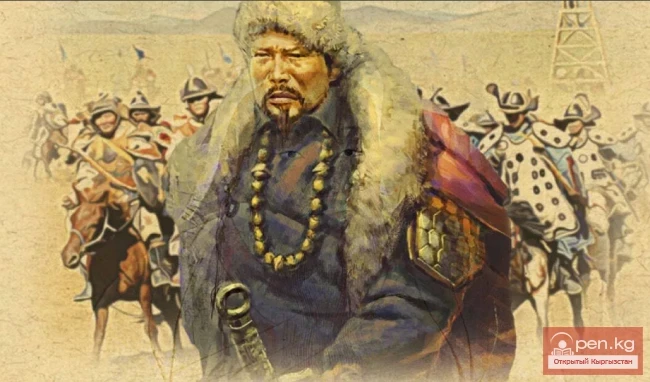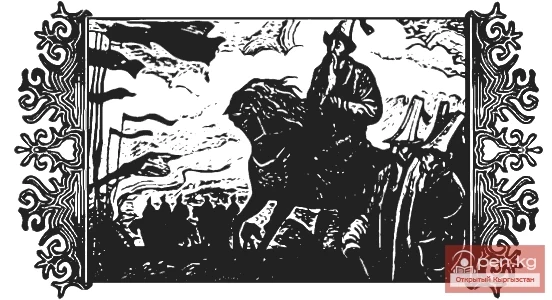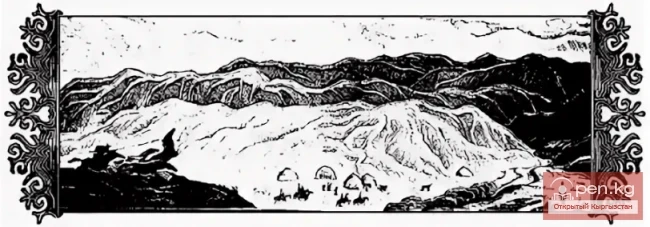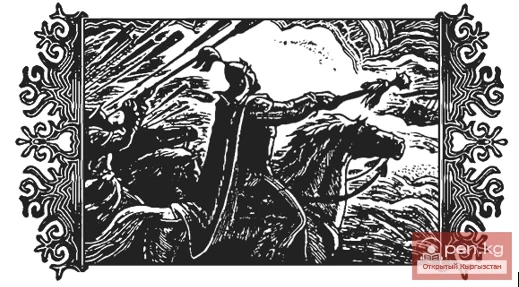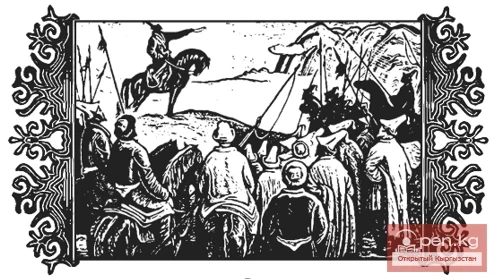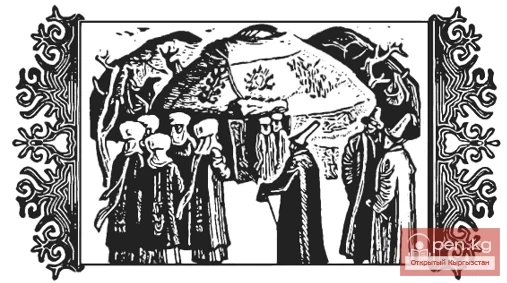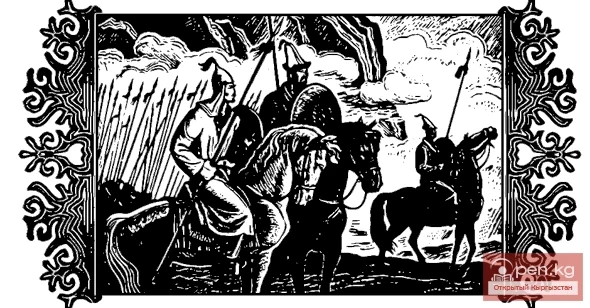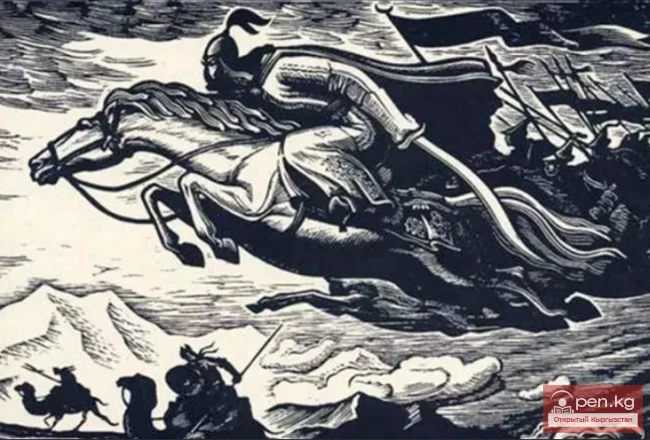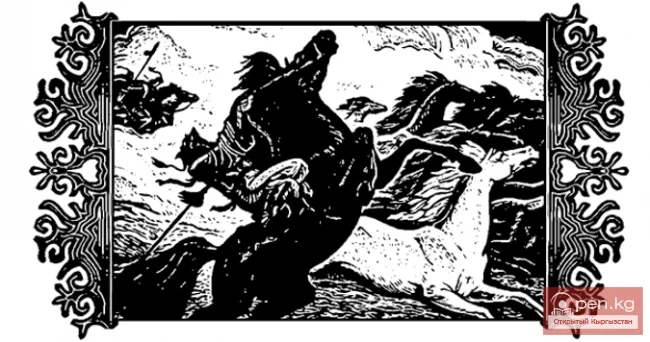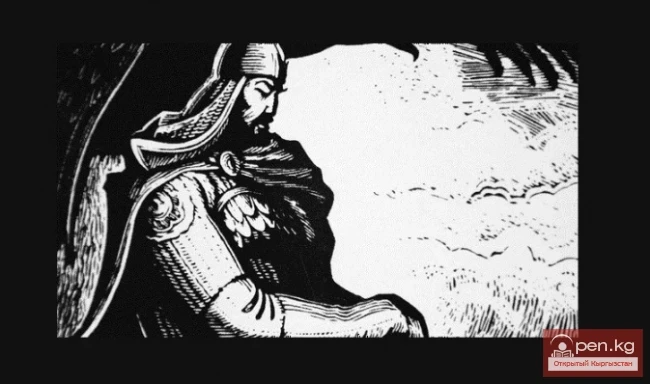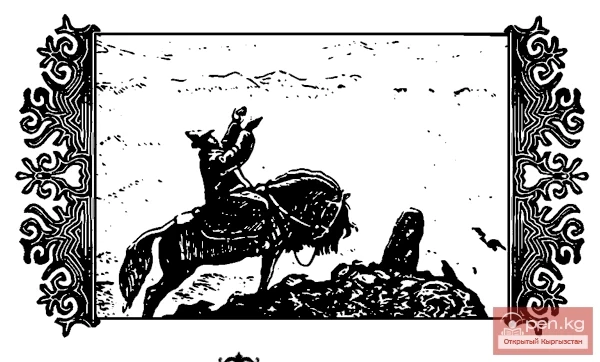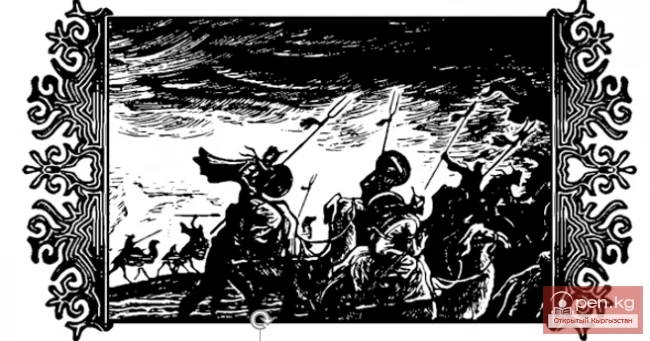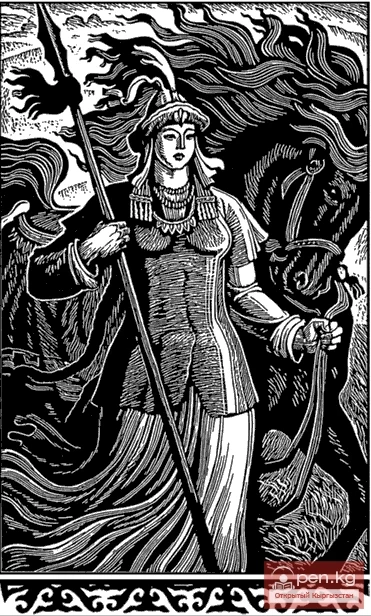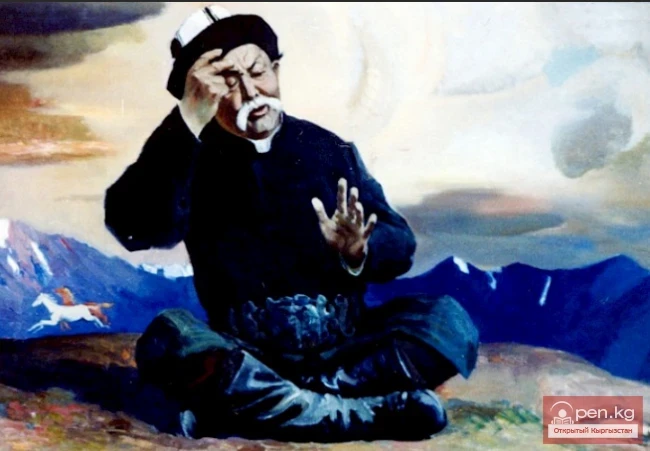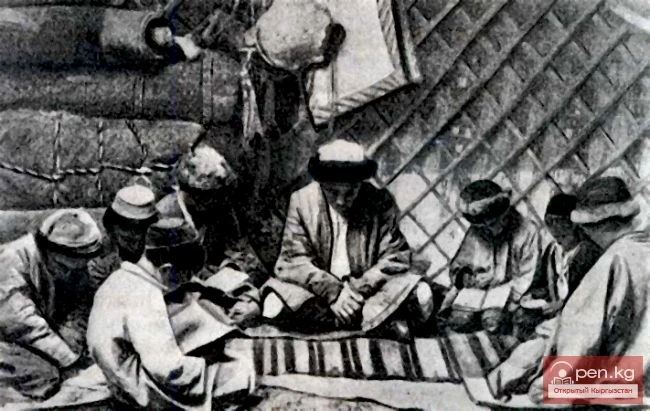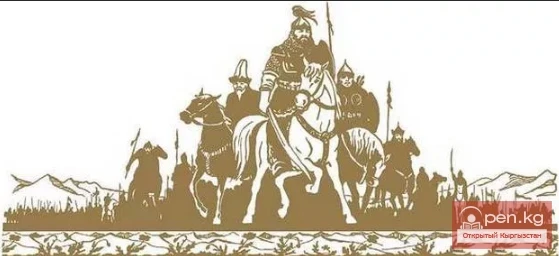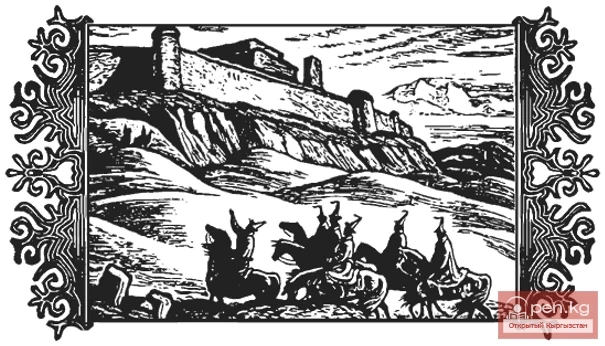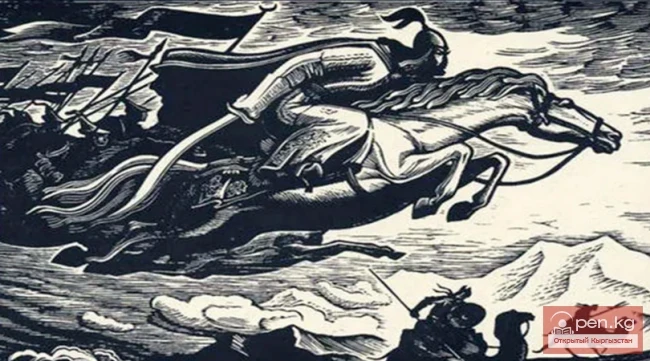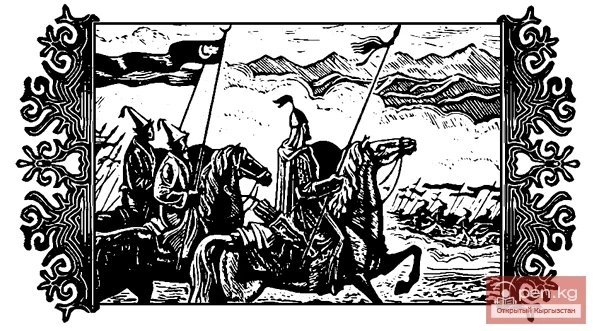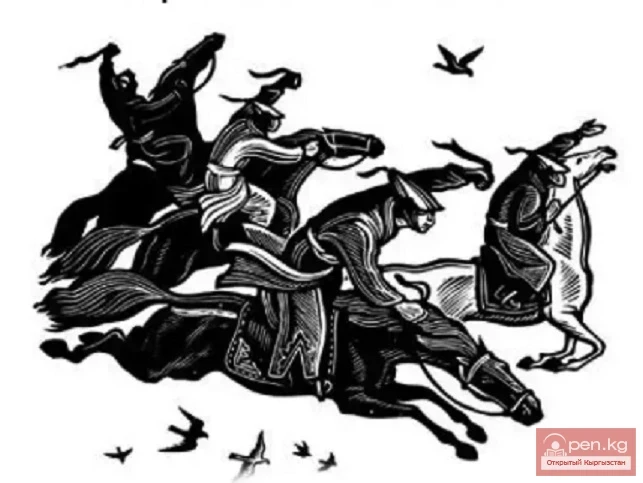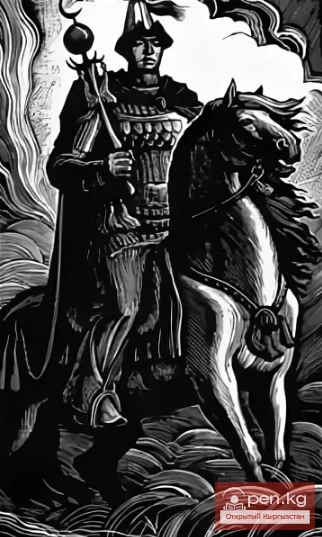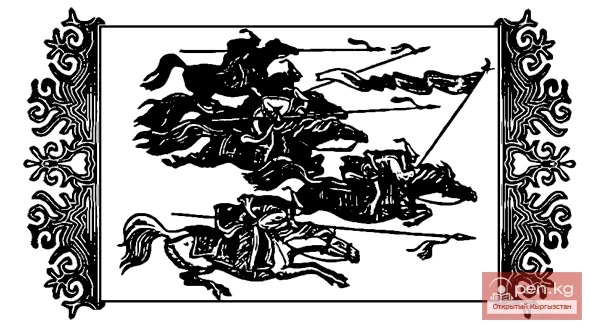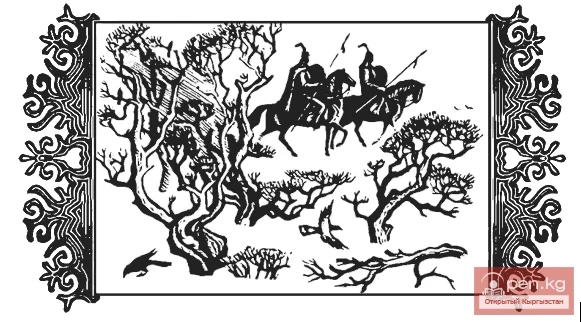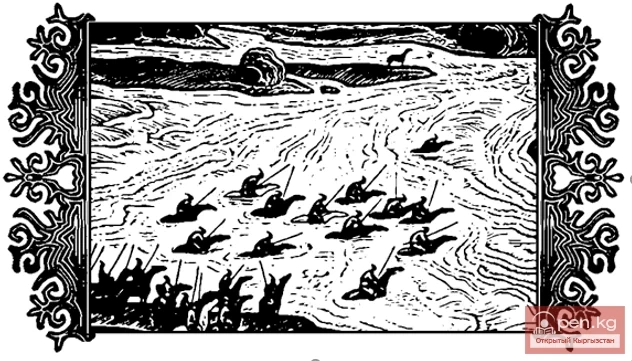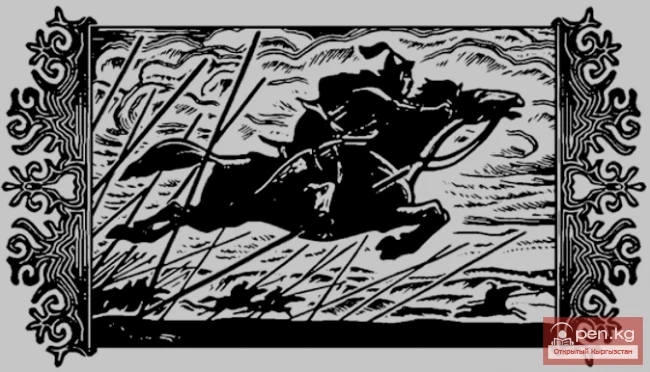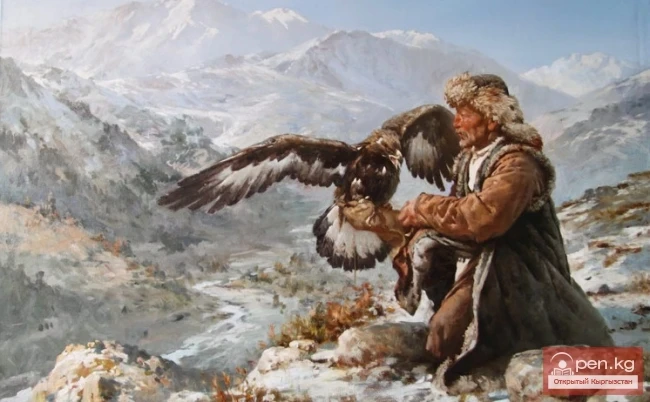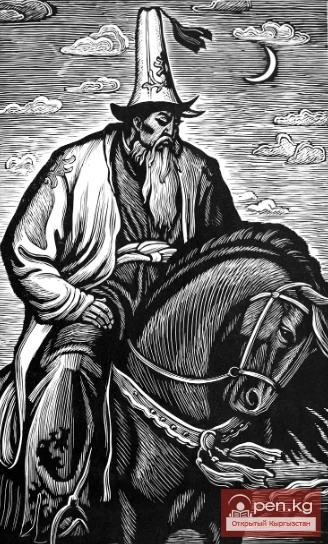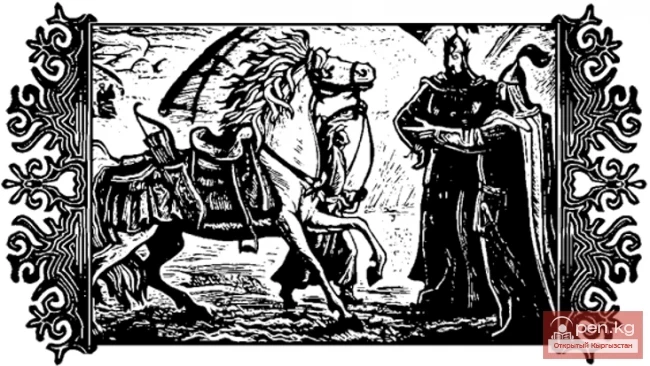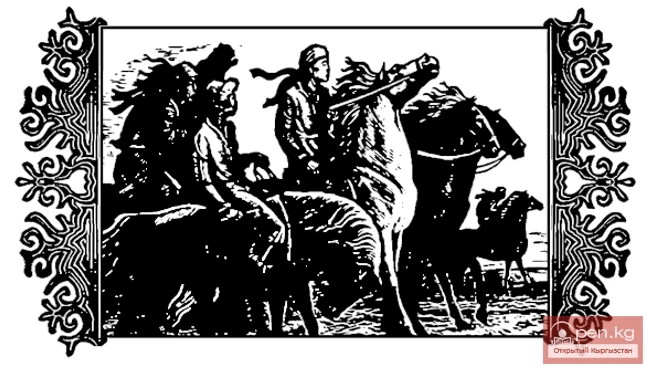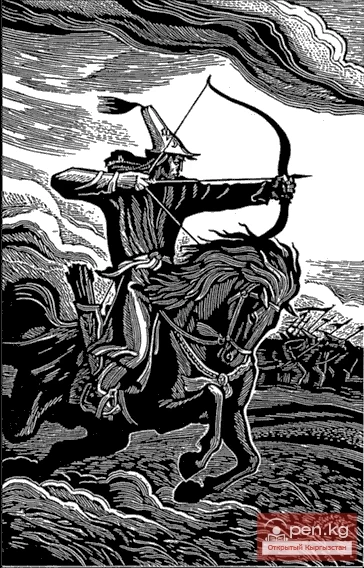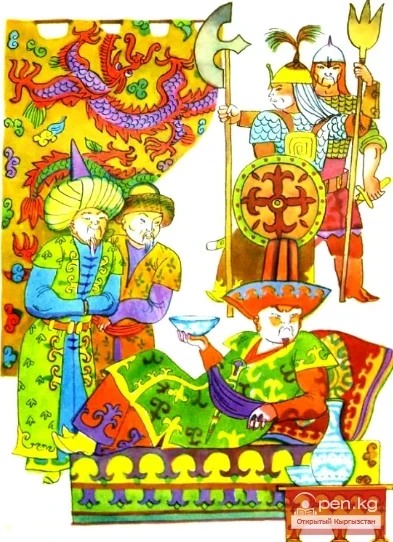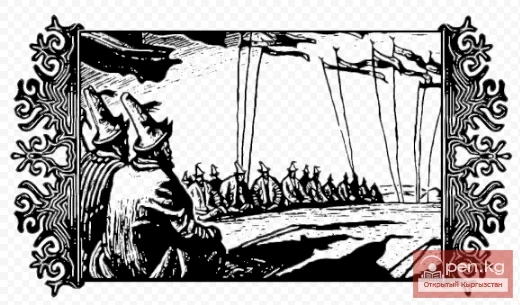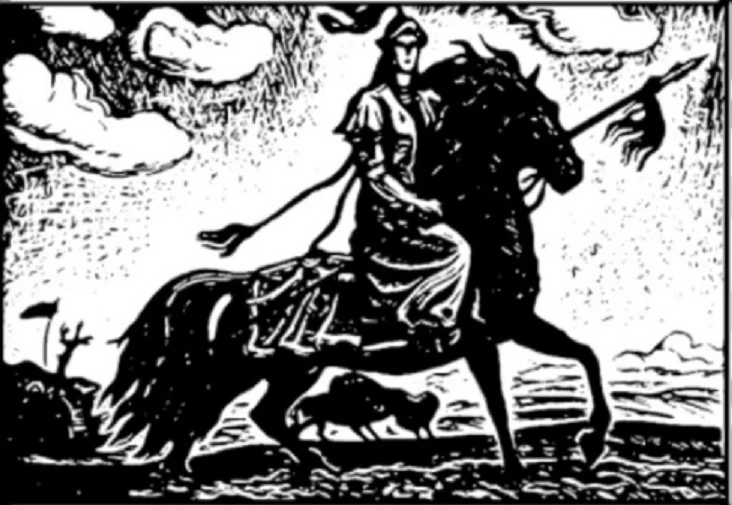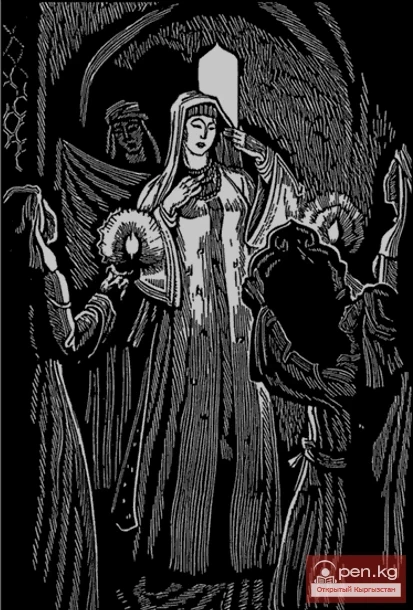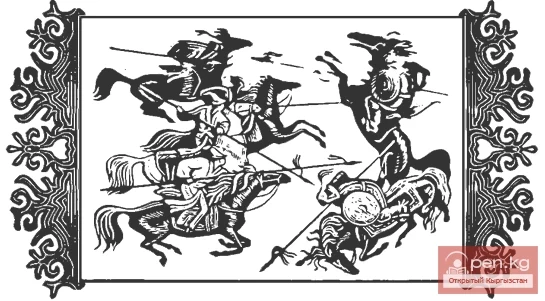
Mourning for Khan Koketey in the Karkyra Valley
Rich and glorious Koketey,
By the will of God and fate,
Reached his last days.
He coughed and groaned loudly,
The wise elder sensed:
His years were over,
That in a day, or maybe two,
He would leave this life forever.
To give his last will,
He called his brother Baymurza.
— I feel my death has come.
I have one heir —
Carefree, young Bokmurun.
He didn’t wipe his nose in childhood —
And that’s how the people named him.
He is only fifteen years old.
I am dying. There is no son.
He fell in love with the maiden Kanyshay,
Went to the girls’ games
In another aiyl, in a neighboring land.
When he returns home,
You must convey my will:
When I leave for another world,
Do not cry loudly over me.
Without noise, modestly, in silence,
Like an old man of advanced years,
Like an old woman who has lived a century,
Return my ashes to the native land.
And let my son from the funeral
Not create a pompous sound.
Let the women — in the morning,
With the setting sun by the fire —
Not wail loudly for me
Throughout the aiyl.
You tell Bokmurun:
Let him not invite many guests,
And let him hold the mourning
Without races and prizes.
In the region, they know — I am rich.
Grazing in my meadows
Is a herd of ten thousand,
About fifty thousand rams,
There will be two thousand camels,
And how many yaks and cows,
No one has counted yet.
And for wealthy suitors
I married off my daughters.
And I have accumulated a lot of gold and silver
In my treasury!
But my son, young Bokmurun,
Is not born for labor, it seems,
He will squander it all.
I fear that upon learning of my death,
The enemies of the Kyrgyz: Neskara,
And Sooronduk, and Konurbai,
The mighty, greedy Khan Joloy —
Will come to our Tashkent land
As if to honor my death,
And will look for a reason
To wreak havoc on the Kyrgyz,
To drive away my countless herds
To different lands.
Let them not send news to Manas.
He is the all-powerful Khan of Talas,
The Kyrgyz kin is now united,
Mighty, strong, invincible,
His retinue is strong.
If there is nowhere to put their strength,
The Choro will climb onto the horn.
And if Neskara, Konur, Manas
Gather for a feast,
I fear that my death, dear,
Will end in bloody war.
The brave Khan of the Kipchaks Urbyu,
And the Khan of Chatkal Muzburchak,
And the valiant Kokche-Kazakh,
Lauded in the tales of er-Toshtuk,
The Khan of Andijan Sanchybek,
And the son of Eshtak Jamgyrchy —
Do not want a single power
And among themselves they say:
“Our hero Manas has become arrogant
And has seized all the power alone.”
There is no need to send them news,
That I am dying.
I fear that gathering here,
Friends will finally quarrel —
Finished, wise Koketey
And, taking his last breath,
Left the world of the living.
And the relatives, friends
Did not have time to mourn the old man,
When his son appeared from afar.
And Bokmurun wept bitterly,
That he did not hear
His father’s will from his own lips.
When night fell in the mountains,
Washing his face from bitter tears,
The people lay down in the yurts,
The black-bearded Baymurza
Quietly called the young man,
And told his son in detail
His father’s will.
— Father gave a command before death:
To bury him in the native land
Not as a ruler-leader,
But as an ordinary old man,
Like a simple old woman.
Without noise, modestly, in silence
He asked to return his ashes to the earth.
He asked that no one in the region
Should announce the news of his death
And that no one
Of the valiant khans should be invited to the mourning.
He asked not to invite Manas, his friend,
To the feast.
And that the mourning should be held
Without races, alaman-baygi,
Without er-sayish, kurash, jamby.
And in the mornings at dawn
No one should weep for him.
And that they should forget quickly,
That Koketey lived in the world.
Father was famous and rich,
And I could not understand at all,
Why he bequeathed this.
Or maybe the wise elder
Decided with his end
To test you for greed? —
Baymurza added at the end.
(And the cunning man did not say this for nothing!
In fact, he wanted
To drink, eat, and have fun
At the feast in memory of the old man).
But Bokmurun understood his father’s will
Differently:
He decided, in mourning for his father,
To gather guests from all sides
And hold the mourning
So that the ages would remember
Who the late Koketey was!
And right away he ordered to saddle
The horse named Maanikер.
He rushed, as soon as the light dawned,
To his father’s faithful friend —
To Manas to get advice.
And by evening, the swift Tulpаr
Brought him to the Talas River.
Learning that Koketey had died —
A faithful friend, devoted in battles,
Manas pressed him to his chest
His heir in tears.
And he told with annoyance,
That he was far from home,
That no one informed him
That his father was dying.
That he did not hear his father’s will
With his own ear,
That his uncle Baymurza
Had conveyed the command in detail,
Manas tearfully asked,
That he himself lead the mourning
For his father.
The self-satisfied er-Manas
(We have seen this more than once)
Was flattered by such a request
And promised Bokmurun
To hold the mourning for his friend,
So that the whole world would know about him,
At the feast, it would be managed
Not by someone else, but by him personally!
And he gave Bokmurun the order:
To invite friends and foes around
To the memorial feast,
And if anyone suddenly refuses
And does not come to the mourning,
That one will be punished here!
The young Bokmurun did not understand
The true meaning of the order
That Khan Manas decided,
Gathering at Koketey’s feast
His enemies and foes,
And with them close relatives,
To show the bravery of the warriors
In shooting at the golden jamby,
In er-sayish and wrestling,
In alaman-baygi races,
To arrange a military parade,
So that they would see once again,
How formidable and powerful Manas is.
Receiving Manas’s advice,
Satisfied with himself, Bokmurun,
As soon as dawn arrived,
Left for sunny Tashkent.
And the swift Maanikер
Rushed like a winged beast.
About his trip to Talas,
What order he received there,
None of the relatives knew.
Now the elder was returned to the earth,
They fell to their knees,
Held the farewell ceremony,
Dozens of fat mares,
A hundred rams and cows
Were sacrificed in honor of the khan.
Koshoy Bokmurun called:
— Give me your wise advice,
Honorable uncle Koshoy.
I received immeasurable wealth and cattle
As an heir,
I would like exactly one year later
To hold the mourning with honor,
To invite guests from all sides,
So that my father
Would remain in the memory of people for a long time.
And for the mourning in honor of my father
I will not spare any wealth.
Let everyone in the whole region know,
Who my father Koketey was!
Tell me, uncle Koshoy,
Where is there a wide jayloo,
So that in the yurts thousands of people
Can be freely accommodated,
And nearby a river flows,
So that from afar
They can watch the races of hundreds of horses.
On a hot day, let there be
A gentle coolness for the guests!
And wise uncle Koshoy,
A great connoisseur of the native land
(He was not called for advice in vain),
Said that there is no place in the world
Like the blessed Karkyra.
— A valley of eternal snowy mountains,
To the blue sky a vastness,
Grass, like a velvet carpet,
Below, the Kegen River bubbles,
You won’t find a replacement for it!
The water is clear as a tear,
Tasty, like paradise zam-zam!
And yurts for thousands of guests
Can be set up there.
To dig hundreds of hearths
For samovars and cauldrons,
There are places along the banks,
And we will find pasture for the horses.
The spirit of Koketey will be glad,
If we hold the mourning there!
Bokmurun, the wastrel, grew stronger.
In a year he managed to seize
The ancestral power in the khanate.
He ordered, on the eve of spring days,
To saddle horses for a distant journey,
And to pack cauldrons and yurts
On camels and oxen,
He ordered the aiyls to migrate
To the native land of Issyk-Kul.
And thousands of heads of cattle
To drive to the Karkyra Valley
And to the banks of the Kegen River,
Where in honor of his father
The memorial feast would be held.
And whoever opposes the khan,
Will be punished at that moment:
He will extinguish the fire in the hearths
And scatter the ashes to the wind,
Will take the cattle, burn the whole house
And drive him out of the khanate.
And no one could disobey
The young khan, fearing punishment.
The people learned this year,
How cruel young Bokmurun is.
They assembled the yurts in parts,
Loading on oxen and nar
Dishes, other goods,
Dressing the girls in finery,
Decorating the horse named Maanikер
With silver harness,
Raising the green banner with the moon,
With a retinue of women and widows,
In bracelets, rings, and earrings,
In minks, mourning shawls,
They set out on a distant journey.
And the koshokchi, in turn,
Having agreed among themselves,
Sang praises in tears,
About what kind of khan Koketey was,
What kind of brave man he was in war,
In the world, with friends and family,
How he defended his people,
How he married off his daughters,
What kind of friends he treated,
How he fought for Manas,
How he became glorious and rich.
Driving the people, horses, and other cattle
To the tenth sweat on the way,
By morning on the forty-fifth day
They reached the Kegen River.
And the exhausted caravan,
Having traveled a long, difficult path,
In the valley of the ancestors Karkyra
Was greeted by the mountain dawn.
Epic "Manas". The Tale of How Manas's Relative Kozkaman Wanted to Poison Him
